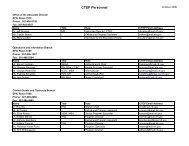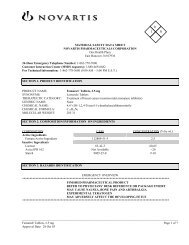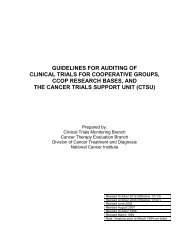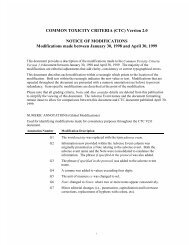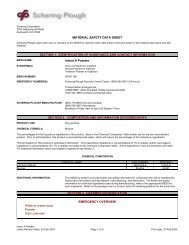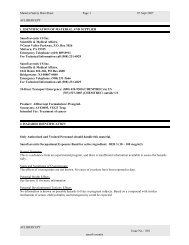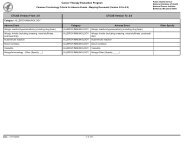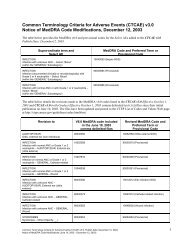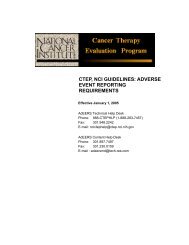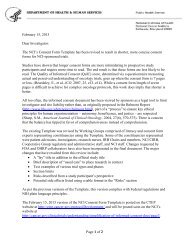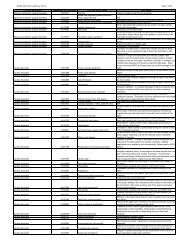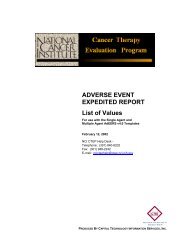NCI National Clinical Trials Network (NCTN) Program Guidelines
NCI National Clinical Trials Network (NCTN) Program Guidelines
NCI National Clinical Trials Network (NCTN) Program Guidelines
Create successful ePaper yourself
Turn your PDF publications into a flip-book with our unique Google optimized e-Paper software.
PART 1: Overview of the <strong>NCTN</strong> <strong>Program</strong> Section II – Goals of <strong>NCTN</strong> Research<br />
II. Goals of <strong>NCTN</strong> Research<br />
A. <strong>Clinical</strong> Treatment <strong>Trials</strong> & Advanced Imaging <strong>Trials</strong><br />
The clinical research focus of the <strong>NCTN</strong> <strong>Program</strong> is the conduct of treatment and advanced imaging clinical trials<br />
in oncology. The primary goal of <strong>NCTN</strong> research is to conduct definitive, randomized, late phase clinical<br />
treatment trials and advanced imaging trials (and some development efforts preliminary to those trials if<br />
needed), as part of the <strong>NCI</strong>’s overall clinical research program for adults, young adults and adolescents, and<br />
children with cancer. The definitive evaluation of newly developed therapies, including multi-modality<br />
treatments, combinations of novel agents, and molecularly-based treatment and advanced imaging approaches,<br />
for cancer care will benefit patients and practitioners as well as the entire oncology research community. An<br />
equally important focus of the <strong>NCTN</strong> is an emphasis on trials in special populations (e.g., children, adolescents<br />
and young adults, and underserved populations) and rare tumors. This focus allows the <strong>NCTN</strong> <strong>Program</strong> to<br />
complement, rather than duplicate, research conducted by the private sector.<br />
Each <strong>Network</strong> Group should attempt to accomplish the design of trial concepts and the initiation, conduct, and<br />
analysis of approved trials within the limits of its peer reviewed and approved scope of work and its allocated<br />
budget. This includes reprogramming non-restricted funds when necessary to support the highest priority<br />
activities and trials. The responsibility for overall financial management also includes careful consideration of<br />
the financial impact of proposed trials, not only on patient care costs, but also on the short-term and long-term<br />
costs associated with data collection, data analysis, quality assurance, and onsite auditing. To the extent it is<br />
practical and consistent with the scientific aims, cost containment at all levels of study conduct should be a<br />
factor in protocol design.<br />
<strong>Network</strong> Groups are encouraged to seek other sources of funding to accomplish their full research agenda.<br />
Indeed, the standing infrastructure supported by <strong>NCI</strong> resources for the <strong>Network</strong> Groups serves as a unique asset<br />
in competing for other NIH funding as well as private sources of funding to support specific aspects of a <strong>Network</strong><br />
Group’s overall research program.<br />
B. Ancillary Studies<br />
The database of patient information accumulated in the course of <strong>NCTN</strong> clinical trials, the systematic large-scale<br />
collection of biospecimens from those trials, and the opportunity to correlate specific features of those<br />
biospecimens with patient outcome, provide the <strong>Network</strong> Groups with unique opportunities to address<br />
scientific questions about molecular genetics, epidemiology, pathology, and other cancer-related topics. Such<br />
investigations can add considerable strength to a <strong>Network</strong> Group’s total scientific program and are encouraged.<br />
While integral or integrated studies associated with a phase 3 or large, randomized phase 2 trial may be eligible<br />
for financial support through the Biomarker, Imaging, and Quality of Life Studies Funding <strong>Program</strong> (BIQSFP) at:<br />
http://biqsfp.cancer.gov/, a variety of other funding mechanisms – including investigator-initiated grants (R01s,<br />
P01s) and Cooperative Agreements for discrete projects (U01s, U19s) may also be appropriate for funding these<br />
ancillary studies. Although the <strong>NCTN</strong> supports the collection of biospecimens in conjunction with clinical trials<br />
conducted by the <strong>NCTN</strong>, direct funding for correlative science studies outside of BIQSFP and/or specific<br />
<strong>NCI</strong>/DCTD approved administrative supplements for specific trials is not provided under or in association with<br />
the <strong>NCTN</strong> <strong>Program</strong>. Access to biospecimens collected in conjunction with an <strong>NCTN</strong> trial will be guided by the<br />
appropriate review process (see Part 1: Section IV.C.3. of these <strong>Guidelines</strong>) regardless of the funding source<br />
used for the collection or storage of the biospecimens. Funding for services of Reference Laboratories is not<br />
provided under the <strong>NCTN</strong> <strong>Program</strong>.<br />
C. Cancer Control, Symptom Management, Prevention, and Quality of Life Studies<br />
The <strong>Network</strong> Groups supported by the <strong>NCI</strong>/DCTD <strong>NCTN</strong> <strong>Program</strong> may also apply to be a Research Base under<br />
the <strong>Clinical</strong> Community Oncology <strong>Program</strong> (CCOP) to receive funding from the <strong>NCI</strong> Division of Cancer Prevention<br />
(DCP) for the design and conduct of cancer control, symptom management, prevention studies, and quality of<br />
life (QOL) studies, including QOL studies associated with <strong>NCTN</strong> trials. The peer review of a CCOP Research Base<br />
application from a <strong>Network</strong> Group is performed separately from the peer review of a <strong>Network</strong> Group<br />
Page 22 of 241



